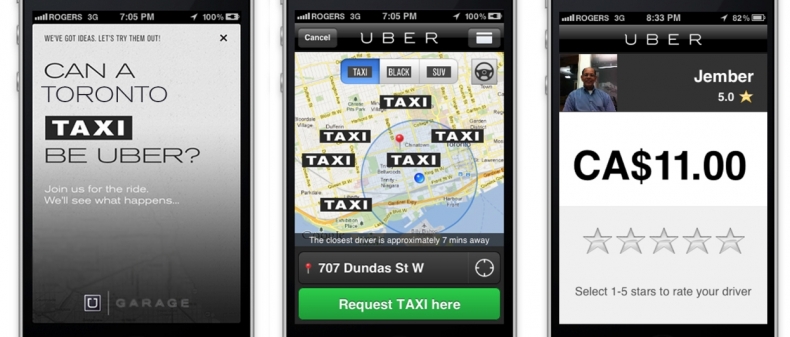
Image via Flickr user Dan Iggers
On August 31, Uber, a San Francisco start-up that’s been making headlines with its on-demand transportation app, announced that it will start to offer its customers the option of taxicab pickup in Toronto. When the service was announced last month, Toronto became the second city in North America after Chicago where Uber offers the option. Across the Internet, the news was greeted with excitement from Uber’s fans eager for more transportation options, but not everyone is happy about the company’s foray into the taxicab dispatch business.
Uber is a technology firm that offers its customers an on-demand driver pickup and drop off service. Uber’s customers can order a ride using the company’s iPhone or Android app (pictured below) or via text message. Using the company’s app, customers can set a pickup and drop off location, and a licensed and insured driver will be there within minutes to take them to their chosen destination. After they’re dropped off, customers can rate their driver and experience. Actual money is never exchanged. Instead, all transactions are done using a preregistered credit card. This, Uber argues, makes it convenient for the customer, who never has to search their wallet awkwardly for money again, and for the driver who doesn’t have to keep a large sum of money in their car, making them a target for burglars.
In the past, Uber was considered a service for the wealthy as the company limited its transportation offerings to expensive black sedans and SUVs. But in recent months, Uber has entered into the more affordable world of taxicab transportation. According to Andrew Macdonald, Uber’s Toronto General Manager, “It’s for folks who want to use Uber every day, twice a day, not just on date night. They can take a taxi to work, a town car to dinner and an SUV to the Leafs game.” Macdonald went on to stress that the company decided to expand its business to taxicabs so that it could offer its customers “quality across all price points.”
Everyone that I’ve spoken to that has used the service has only had good things to say. Moreover, the company has a loyal and passionate fan base across Facebook and Twitter. Still, not everyone is happy with how the three-year-old start-up conducts its business. In a press release from two weeks ago, the Taxicab, Limousine and Paratransit Association, a trade group that represents over 1,000 taxicab companies across North America, called Uber, and companies like it, “rogue services” that utilize apps that “are a danger to public safety and operate in violation of community standards for taxi and limousine transportation in terms of passenger safety, access, non-discrimination and regulated fares.” In the same statement, the trade group goes on to say, “The passenger is not assured of being transported in a properly insured, publicly inspected vehicle operated by a driver who has cleared a criminal background check and who is required to provide nondiscriminatory, community-wide transportation service at a pre-set, regulated fare.”
Image courtesy of Uber
In an email to The Verge, Uber CEO Travis Kalanick responded to the Taxicab, Limousine and Paratransit Association’s claims, stating, “This is propaganda generated by an entrenched incumbent adverse to technology, innovation and progress as it negatively affects the value of their business in favour of drivers and riders.” When asked about the trade group’s statement, Macdonald echoed Kalanick’s sentiment, saying, “The personal transportation industry has a vested interest in things remaining the same; new companies, while they may be more efficient, are disruptive to these existing players.” Both Kalanick and Macdonald have a valid point; the Taxicab Association condemns Uber with the language and rhetoric of a group averse to change. However, there is validity to some of the group’s claims.
Unlike its main competitor in Toronto, Hailo, Uber is not licensed as a taxi brokerage in Toronto. In its terms of use, Uber absolves itself of any responsibility and liability for the transportation services that the company links its customers to. In capital letters, the company’s terms of use proclaim, “[Uber] HAS NO RESPONSIBILITY OR LIABILITY FOR ANY TRANSPORTATION SERVICES PROVIDED TO YOU BY SUCH THIRD PARTIES.” When I asked Macdonald about Uber’s terms of use, he said that customers don’t have to worry about any potential accidents, because “Uber is only interested in working with licensed and insured drivers,” implying that should an accident happen, the driver’s insurance would cover it. I asked Richard Muncha, a manager at the city’s Municipal Licensing and Standards board, how Torontonians should approach Uber and its worrisome terms of use, his advice was “buyer beware.”
If the lack of clarity from both parties on the subject seems troublesome, it is. And it appears that Uber and the city have butted heads over this exact issue in the past. I had heard rumours that the company was issued a cease-and-desist by the City of Toronto – in the past, Uber has been issued cease-and-desists in cities like Washington DC. However, when I asked Macdonald and Muncha about a cease-and-desist, both refused to comment on the matter, simply stating that both parties were open to talking to one another and that CEO Travis Kalanick had met with city officials.
Still unsure how exactly Uber is operating in Toronto, I asked Macdonald if Uber employs drivers with either a Standard or Ambassador license, to this Macdonald reiterated the familiar refrain of “Uber is only interested in working with licensed and insured drivers.”
Uber actively courts taxicab drivers by promising them a free iPhone and a guaranteed 20 per cent gratuity on each and every fare they make. In exchange, the drivers have to submit to constant review from the customers they collect while working for Uber. Theoretically, such a feature would allow Uber, after collecting a large enough of a sample, to restrict their driver pool to only considerate and safe drivers. However, given the amount of cars and bad drivers out on the road, even the best drivers are at risk to be in an accident. Again, according to Uber’s terms, the company is not responsible or liable for the actions of any driver it links its users with, so should an Uber employed driver be an accident and be sued, they won’t get any support from Uber. However, given the structure of Toronto’s taxicab licensing system, the potential financial pay off for working for Uber may far exceed the risks.
The City of Toronto enforces a two-tier licensing system. The first and more numerous tier is called the Standard Taxicab License. At any given time, there can only be 3,480 cars operating with a Standard Taxicab License in Toronto. Moreover, each license has a market value, and, according to Muncha, in recent years the city has sold a single Standard license anywhere from $249,000 to $350,000. In contrast, the second license, called the Ambassador Taxicab License, is limited to 1,403 concurrent drivers and the license does not have a market value. And unlike vehicles licensed under the Standard License, only one driver can operate a vehicle licensed as an Ambassador cab, and they can only do so for a maximum of twelve hours a day.
A study published in 2008 found that the average taxicab driver in Toronto works 77 hours a week, and depending on whether they lease or own their own taxi, earn between $2.83 and $3.44 an hour. To put those earnings in perspective, it would take a driver who leases their cab 87,986 hours, or approximately 1143 77-hour work weeks – that is, almost 22 years – to purchase a Standard License at its lowest market value price. According to Muncha, a city bylaw stipulates that only a licensed taxicab driver can purchase a Standard License – the taxi brokerages that connect riders with taxis are not allowed to own either of the two licenses. When I pushed him to explain to me how the average cab driver could afford a Standard License, Muncha said that since 1999, when a law to limit the purchasing pool of a license to only taxicab drivers was instituted, Standard Licenses have only been purchased by licensed taxicab drivers.
Even if we take Muncha’s statements regarding the city’s taxi bylaws at face value, and assume that every cab license is owned by a single cab driver, then this is where companies like Uber and Hailo will help drivers most. In addition to the mandatory 20 per cent gratuity on every cab ride, Macdonald indicated that the cut Uber takes from drivers was more reasonable than traditional taxi brokerages. In fact, Macdonald was so confidant in the incentives his company offers to drivers that, in an interview with blogTO, he said, “We think that our drivers will do so well supplementing their income with Uber, that they won’t want to use any other product.”
Public transit options like the TTC often dominate the transportation discussion in the public forum, and rightfully so. However, taxicabs are just as an important part of how we traverse our city. In fact, Torontonians take almost 50,000 cab rides per day. Horror stories of cab rides gone wrong are common, and, as consumers, we deserve a better experience. And while there may be issues with some of their stated business practices, companies like Uber are promising better service, and seem to be delivering on that promise. At the same time, as citizens of the same city, we also have an interest in our neighbours prospering and flourishing. Companies like Uber appear to delivering on that front as well. This year, the City of Toronto is engaging in a comprehensive review of its taxi bylaws. Taking into account how companies like Uber and Hailo can be a part of a potential transportation solution, while ensuring that Torontonians feels safe riding in their taxicabs, would be in everyone’s best interest.
____
Igor Bonifacic is a simple intern working for the Toronto Standard. You can follow him on twitter at @igorbonifacic.
For more, follow us on Twitter @TorontoStandard and subscribe to our newsletter.














